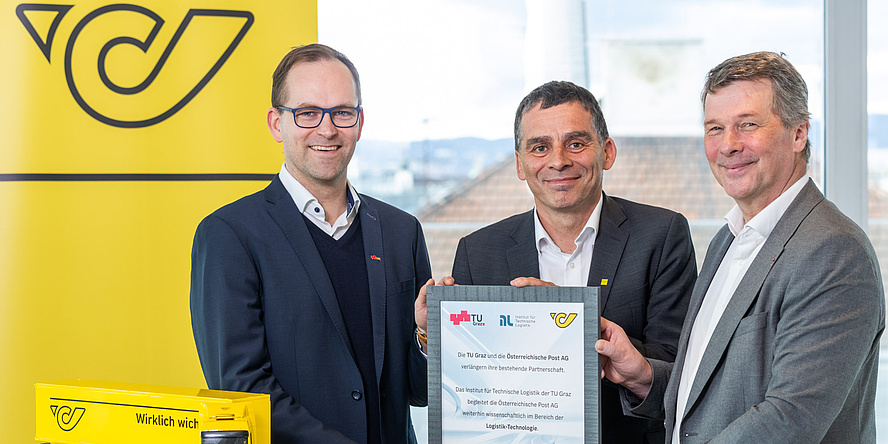The Institute of Logistics Engineering at Graz University of Technology (TU Graz) and Austrian Post are starting the recently agreed two-year extension of their cooperation project with two new research projects. The topics of the new projects comprise the simulation of flexible mail items (polybags) in bulk as a continuation of previous research in this specialist area, and increasing the degree of automation in internal transport in logistics centres.
“The logistics industry is highly technologised, something which spurs Austrian Post on to stay ahead of the trends without losing sight of practical applications. We have already implemented successful innovations with TU Graz in the past, and with research into autonomous vehicles in logistics centres and the comprehensive simulation of polybags, we also have our finger on the pulse here,” says Peter Umundum, deputy CEO and member of the management board for Parcel & Logistics, Österreichische Post AG.
Research innovation based on practical problems
“Pioneering scientific work based on forward-looking practical issues. Thanks to the cooperation with Austrian Post, research in the field of logistics technology at TU Graz is taking place precisely in this area. Our researchers can transfer their valuable basic work directly into practical applications, which is why this excellent collaboration is extremely valuable for both sides,” says Horst Bischof, Rector of TU Graz.
Domenik Kaever, head of the Institute of Logistics Engineering at TU Graz, adds: “In the field of logistics technology, interdisciplinary expertise is more in demand than ever. At our institute, the subjects of mechanical engineering, mechatronics and IT come together and can be perfectly combined in our university environment. Combined with our knowledge in the field of (parcel) logistics, we are able to enrich specific practical problems with the all-important basic knowledge and thus develop solutions. Our expertise in virtual engineering in particular enables us to think about and optimise systems digitally.”
REBEKKA follows ISAAK: physically accurate simulation of plastic bags in bulk
The topic of flexible post consignments in the form of so-called polybags, for example, has been a major concern for the logistics industry for several years now, as their number has increased significantly. In order to optimise the sorting process here, the Institute of Logistics Engineering has developed the physically accurate simulation of such packaged consignments in the ISAAK project. Together with Austrian Post, this research is now being continued in the REBEKKA project. Whereas ISAAK was only able to simulate one flexible mail item at a time, a modelling system is now being developed in which these mail items can be simulated in bulk. This should significantly improve the automated handling of these consignments and help to optimise the equipment technology.
Automated transport in parcel distribution centres
The second project, which is already being implemented with Austrian Post, revolves around the automation of transport within a parcel distribution centre. For example, there are many different operating resources (roll containers, pallets, etc.) that have to be transported from A to B. To this end, the Institute of Logistics Engineering is identifying corresponding use cases in order to increase the degree of automation for such transport operations where it is technically possible and economical. The first driverless transport vehicles are already in operation at the Tyrol logistics centre in Vomp; now the next driverless transport system is to be created at the logistics centre in Vienna-Inzersdorf. This solution is also to be transferred to other locations.
Would you like to receive the latest stories, news, research stories, interviews or blog posts from TU Graz directly on your smartphone or in your email inbox? Subscribe to the TU Graz Telegram newsletter free of charge.

